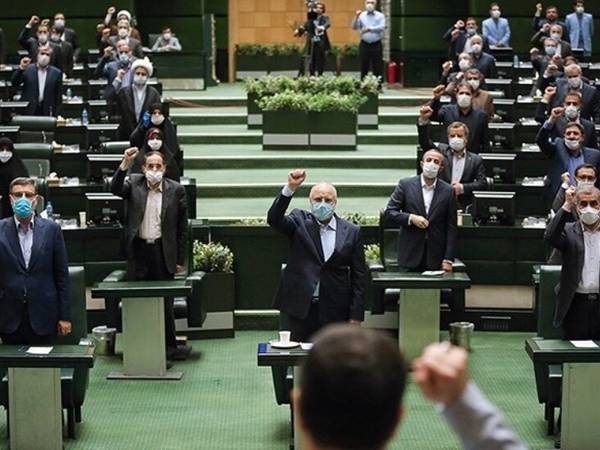Iranian lawmakers appear to be not equally informed about Tehran's nuclear negotiations with world powers aimed at restoring the 2015 agreement known as JCPOA.
While one lawmaker was certain that "Iran has reached an agreement better than before with the United States," another member of the Iranian parliament says that the Majles has been kept in the dark about the negotiations in Vienna.
Another Iranian lawmaker was quoted by local media as saying that he is less concerned about the initiatives and positions of the other side than about the plots being hatched by regime insiders in Iran to derail the negotiations.
Hardliner lawmaker Hossein Naghavi-Hosseini told Nameh News in Tehran that he is certain the negotiations will bear fruit and an agreement is at hand, although there are still issues that have not been tackled by the negotiators.
Naghavi-Hosseini said that Iran will announce its final verdict on the deal within a few days. He said Iran is adamant to reach a deal, adding that everything has been agreed upon except the guarantees that Iran demands that the next US President will not pull out of the nuclear agreement with Iran.
The hardliner lawmaker went on to say that the two sides have agreed all the sanctions imposed on Iran after President Donald Trump's pull-out from the JCPOA in 2018 will be lifted. What Iran and America have agreed upon is not much different from the JCPOA, he said and explained that Westerners are concerned about Iran's ability to enrich uranium beyond the 60-percent level.
Although Naghavi-Hosseini appeared or claimed to be well-informed about the deal, his colleague Jabbar Kouchakinejad told reporters on Thursday that the parliament has not been informed of the government's views about the talks. He also said that there are still problems about the impact of US sanctions on Iran's economy, insurance and oil industry and international trade which have not been resolved.
Kouchakinejad said there are a lot of ambiguities about a possible deal with America as Majles Speaker Mohammad Bagher Ghalibaf has offered minimal explanations to lawmakers. He added that it is important for the Majles to make sure that any possible agreement does not undermine previous laws passed by the Majles.
Kouchakinejad added that the Majles is also concerned that problems in the United States' domestic politics could prompt any US government to withdraw from a deal with Iran. That is why Iran insists on getting guarantees from the US side, although so far Washington has refused to give any such guarantee.
Meanwhile, he said that as far as safeguard regulations of the JCPOA are concerned, Iran has red lines that cannot allow IAEA inspectors to visit some of its nuclear sites.
At the same time, former Iranian lawmaker Jalal Mirzaee told Asr-e Ma in Tehran that some political elements in Tehran are pushing hard to derail the nuclear talks. Mirzaee, a professor of political science, said that he is more concerned about the adverse impact of these moves than he is concerned about the decisions being made in other capitals.
He said moves opposing an agreement have intensified following the Russian invasion of Ukraine. He warned that such moves which are motivated by factional interests have led to wasting of a lot of time and opportunities for Iran and could lead to further costs. "We should seize the opportunity and relieve the country of its tremendous financial difficulties while President Biden urgently needs a deal with Iran," Mirzaee said.
